My Time At Town - Neil Redfearn: “It was just one thing after another, it was never a smooth ride.”
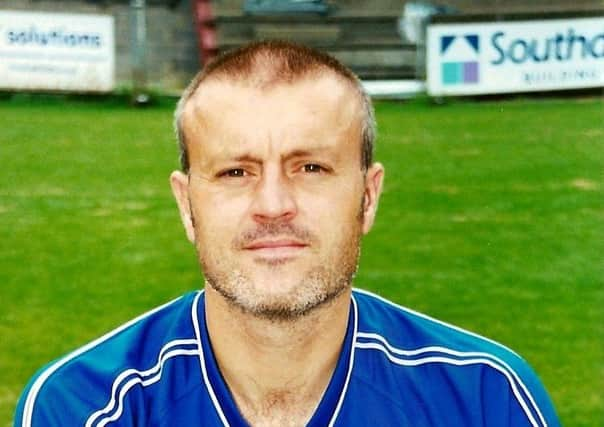

Neil Redfearn had come to Halifax to take his first steps into coaching, but ended up experiencing a crash course in football management.
The former Barnsley and Bradford midfielder was thrust into the hot-seat twice during the 2001-02 season, contending with a doomed battle against relegation from the old Third Division amid financial struggles that would culminate in the club entering administration.
Advertisement
Hide AdAdvertisement
Hide AdAll of which Redfearn was blissfully unaware of when the move to Halifax first materialised.
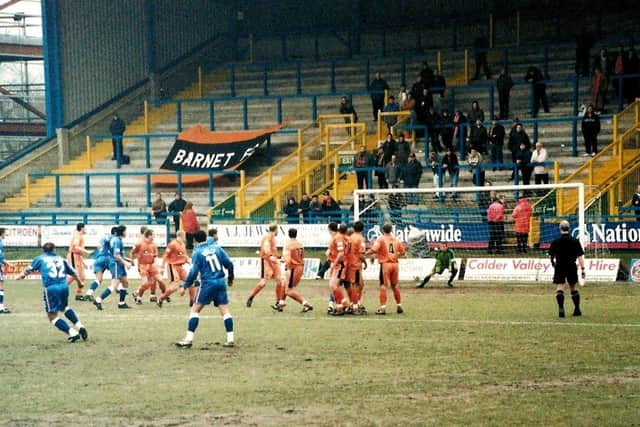

“I was at Wigan at the time but I wasn’t getting much first-team football,” he recalls. “Bruce Rioch was the manager.
“There were two or three clubs that had been in for me, and at that time of my career I was thinking about what I’d do after.
“I think Paul Bracewell (Halifax manager) came to a reserve team game I was playing in for Wigan at York and I met him afterwards.
Advertisement
Hide AdAdvertisement
Hide Ad“He said he wanted me to come and be part of the staff but first and foremost he wanted me to play, which appealed to me.
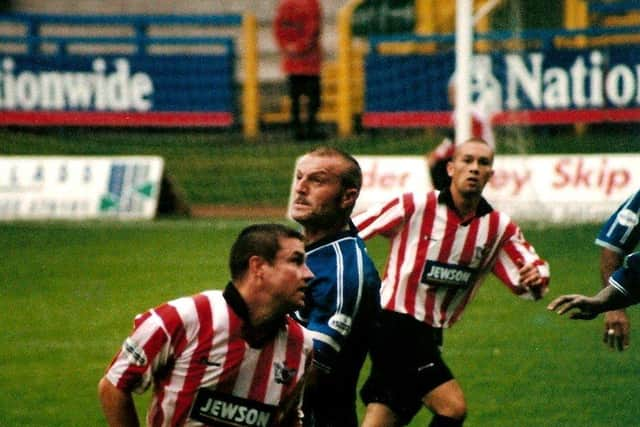

“My mate Steve Thompson was already there and I’d spoken to him about it. “We were struggling for a training ground, I think the first place we trained was up at Elland Cricket Club on the outfield. The surface was perfect but not ideal as a training facility.
“We were struggling at the bottom of the table, but it was a case of getting used to the division.
“I remember Paul Bracewell saying to me ‘listen, you’ll be fine, you’ll breeze this level, but the problem is your team-mates can’t’.
Advertisement
Hide AdAdvertisement
Hide Ad“He said I’d maybe have to taper my game a bit because obviously they wouldn’t be able to do what I wanted.
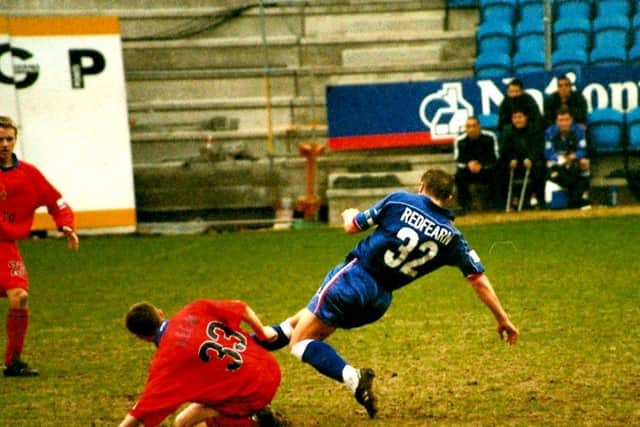

“We had some good young players coming through like Chris and Matt Clarke, we had a proven striker in Steve Kerrigan, so we weren’t in a bad position squad-wise.
“It was just a struggle financially, it didn’t have much financial backing at the time.
“We had to travel to a lot of games on the day. I can remember when we went into administration further down the line, I think we played away at Torquay and we set off at something like half-three in the morning, won, and then travelled back the same day. The chairman, Bob Walker, came up to us after the game and said ‘that was brilliant, we’ll have to do that more often’.
Advertisement
Hide AdAdvertisement
Hide Ad“It was so unprofessional but that’s where we were at the time.”
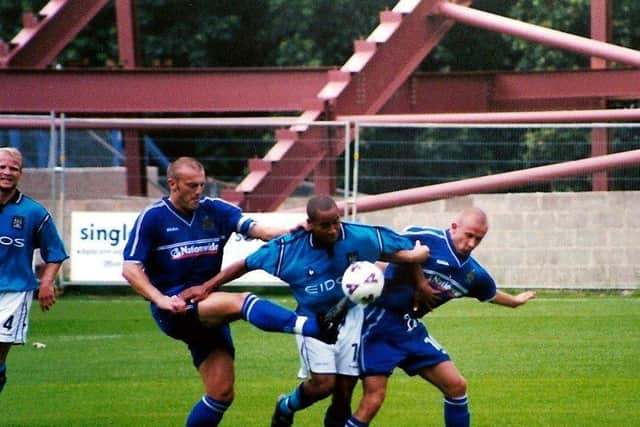

Having been appointed in October 2000, Bracewell just about guided Town to safety that season, finishing 23rd, two points above relegated Barnet.
“We managed to scrape through that season and the idea was to have a better prepared season after that,” says Redfearn.
“I think we trained at a place in Huddersfield, like a college site, but we had a building to change in, we ate there together and the pitches were a bit better.
Advertisement
Hide AdAdvertisement
Hide Ad“We were trying to do the right thing but I think we only played about two or three games and then Paul Bracewell decided that was it, he’d had enough, and took Richie Barker with him, so they asked me to go in as caretaker, which was a bit of a baptism of fire really.
“It’s a tough gig anyway managing a football team, but it’s nigh-on impossible playing and managing.”
Only a few months after Bracewell had convinced Redfearn to join Town, the experienced midfielder was replacing him in the dugout.
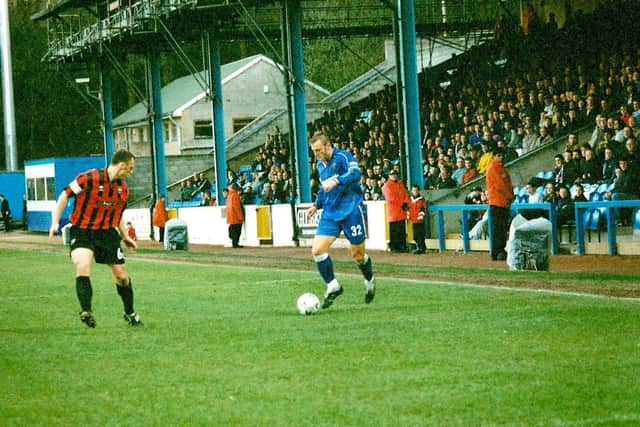

“One of the reasons I came was for him because he painted this picture and he was somebody I respected and I’d played against,” says Redfearn.
Advertisement
Hide AdAdvertisement
Hide Ad“He played at a high level with Everton and Sunderland and had a good career.
“I’d bought into his vision and not that far down the line it ends up with me getting the job on a caretaker basis, right at the beginning of the season when everybody’s hopes are up and you’re up against it.
“But the lads were brilliant all the way through it, they got on with it, they all rallied round.
“We had a good group who wanted to work and do well, but obviously it was a tough time.”
Advertisement
Hide AdAdvertisement
Hide AdRedfearn feels Bracewell’s approach wasn’t always conducive to the ways of Division Three football.
“What he wanted to do was fine, the hard part perhaps was that he’d played at a much higher level and the standard’s not going to be as good, and maybe it needed the experience of somebody that had been at that level to understand it.
“We played some good stuff and we tried to get it down and pass it, but you’ve still got to swim in the waters you’re in.
“That level is a tough division, it’s a certain way of playing and you’ve got to play like that, and then in-between you’ve got to try and get it down and play as well.
Advertisement
Hide AdAdvertisement
Hide Ad“But it was getting the balance right and I don’t think perhaps in my time there under Brace, I don’t think we got the balance right of playing and competing, and putting the ball in the right areas to put teams under pressure.”
So it was down to Redfearn and goalkeeping coach Tony Parks to step into the hot-seat just five games into the season.
“It had all happened in a whirl but luckily enough we had good people and they understood what was happening,” Redfearn says.
”It was a shock for them and a setback. The thing that softened the blow was they had a recognisable face and a voice, and I’d got respect for the career I’d had, so it wasn’t that difficult to sit down in-front of them and go ‘look, what’s happened has happened, we’ve got to get on with it, we’ve got the whole season in-front of us, we’ve got to try and kick on’.
Advertisement
Hide AdAdvertisement
Hide Ad“It actually galvanized the group a bit, there was a determination to crack on.
“It was a difficult one because Brace had brought quite a lot of them in, and they’d come under the same guise as me. You sign for a manager, you buy into the vision and then two or three games later, he’s gone.
“I understood why he left but you’ve got to pick the pieces up for the lads that are left.
“I thought they mucked in together and got on with it. It was just an uphill battle then, taking a blow right at the beginning of the season, which isn’t great when you’re trying to get some momentum.
Advertisement
Hide AdAdvertisement
Hide Ad“I took it on, but I think the club was always looking for another manager because I wanted to play and I wanted to coach.
“It’s less of a problem initially because you just do it, but it’s tough playing and managing.
“I’ve only ever been sent-off twice in my career, and that was both times when I was player-manager at Halifax.
“It’s the pressure of managing and playing. One of them was like an out-of-body experience, I’ve never kicked anybody off-the-ball, but against Rushden and Diamonds, this kid caught me when I was going for the ball, I turned round and just booted him.
Advertisement
Hide AdAdvertisement
Hide Ad“Obviously it’s a red card, I didn’t even look, I just walked off.
“But it’s the pressure of trying to hold everything together that gets to you.
“There wasn’t much money there anyway. The chairman owned a printers in Elland, he was a wealthy man in his own right, but to actually run a football club I think you’ve got to be prepared to lose a lot of money.
“Everything was done on a shoestring, there wasn’t much support there, and I think this was one of the things where Paul Bracewell thought ‘I’ve not got a chance here’.
Advertisement
Hide AdAdvertisement
Hide Ad“The infrastructure and support network around the manager was very sparse at the club, it was ‘get on with it’.
“We had to source everything, like where we trained, which was a problem for us. We had this facility for a short period and then we looked at the pitches on Savile Park. I remember setting cones out on there and being kicked off by the council because they didn’t have a good relationship with the club because the club owed them money.
“Everywhere we turned we owed people money, so it was tough.”
Redfearn guided The Shaymen to two wins, three draws and four defeats, former Town player Alan Little took over in October.
Advertisement
Hide AdAdvertisement
Hide AdHalifax continued to struggle though, and by March, Redfearn was back in charge.
“Alan had his own ideas, and that was great, we just got on with,” says Redfearn. “Initially I played quite a few games and then he started leaving me out a bit.
“Because I’d done the job previously and I had to have this relationship with the board and the owners, because it was just us and you’re dealing with them daily, I’m not sure if he looked at me and thought I might be a threat to what he was doing.
“That was the problem I could envisage right from the off, if you’re brought in by another manager, as soon as another manager comes in that didn’t sign you, then it’s a different kettle of fish. “I think he struggled health-wise in the end and I ended up as caretaker again until the end of the season.
Advertisement
Hide AdAdvertisement
Hide Ad“And then there was the administration, which was like a farce. The administration company O’Hara’s came in, Mick McGuire came in from the PFA - they saw us first, took me to one side and were basically saying ‘don’t worry about it, the lads’ contracts will be fine and they’ll be alright until the end of the season and through the summer’.
“Then O’Hara’s came in and said ‘as from tomorrow you’re all sacked’ but said ‘we want you to fulfill the fixtures’.
“It would have had a massive impact on the league because at that point I think we were something like eight, nine, maybe 10 games left.
“I think in the end there were a couple of contracts they honoured, players they deemed as assets, and the rest of them were part-paid by the PFA.
“You didn’t get all your wages but you got some of it.
Advertisement
Hide AdAdvertisement
Hide Ad“We got through the season but it was just one thing after another. It was never a smooth ride, that was the problem.
“We had a bit of a cup run, but the league form was up and down, we were always down there struggling.
“When I took over the second time I think we were points adrift, maybe seven or eight points.
“So the lads were battered by then, it was just a case of trying to keep their heads up, keep them going and try to pinch results when we could.
Advertisement
Hide AdAdvertisement
Hide Ad“We had some half-decent results, I remember us beating Cheltenham at home, they were top of the league I think. That was a good day for the club because there were a lot of home-grown kids that got a chance.
“We put the kids in like Andy Farrell, Nicky Heinemann, Craig Smith.
“But it was mis-managed from the top, and when that happens you’re always up against it because you’re talking about the Football League, not non-league, where you can get by on a skeleton staff or run it without what’s needed.
“It was tough, but daft as it seems, you don’t think so at the time but looking back now, you learn far more going into the management side like that because you’re hands-on with everything, you dealt with everything.
Advertisement
Hide AdAdvertisement
Hide Ad“So for me, although it was tough and stressful, it actually taught me a lot.
“There were a couple of months where the wages were late, I think they changed the way they did it a couple of times, so there were problems behind the scenes.
“There were rumblings that the owner wanted to sell it.
“You don’t want all that stuff filtering down to the players, you want somewhere to train, you don’t want them turning up thinking they don’t know where they’re going to train on a daily basis.
“Luckily enough, after Christmas, we got to train on The Shay, but you’re just going from one week to the next, planning from the beginning of that week, and you’ve got no chance.”
Advertisement
Hide AdAdvertisement
Hide AdAs Town’s off field problems mounted, their prospects of surviving another relegation battle looked increasingly unlikely as they became marooned at the foot of the table early in 2002.
On reflection, Redfearn sees a link between the two.
”Without people going out of their way to do it, you’re being undermined, it’s undermining what you’re trying to achieve.
“There’s only so much the lads will take regarding promises and ‘things will get better’, then they start losing a bit of confidence and belief.
“When you’re in it, you’re thinking ‘this is a nightmare, it’s nearly impossible’ but as you get older, get more experienced and take a step back, to actually do what we did, it was like a crash course.
“It was like taking your driving test after four lessons.
Advertisement
Hide AdAdvertisement
Hide Ad“When I look back to my time managing Leeds, some of the lessons I learned about having to manage up, work with players and deal with situations, it was like a cake-walk compared to Halifax.
“There were lots of good things. I think you learn far more in adversity than you do in any successful season.
“But you just felt for the lads and the supporters. My old man played for Halifax and he used to come down with his mates and watch.
“He was proud of the fact I played for them, but there was all that in the background. You’re wanting to do your best for the club and you put yourself out there.
Advertisement
Hide AdAdvertisement
Hide Ad“I remember after the last game of the season we went round the pitch and all the supporters stayed behind and all clapped, because they all knew, they all realised what a s***storm it was.
“They’d seen it unfold during the course of the season and it was near-on impossible.”
Whilst relegation was a massive blow, of more concern was the future of the club itself.
Bob Walker had put it up for sale in February, claiming the wage bill, which had doubled from £650,000 during 2000-01 to £1.2m, was crippling the club.
Advertisement
Hide AdAdvertisement
Hide AdOn April 6, the Inland Revenue claimed it was owed £220,000 and demanded an immediate payment of £107,000. Ten days later, having accrued debts totalling almost £900,000, Halifax Town went into administration.
On May 17, Walker resigned as chairman and he was soon followed out of the club by Redfearn.
“I was still caretaker, nobody told me any different,” Redfearn says.
“You’re waiting for a call but like everything else, it was underhand and cloak and dagger.
Advertisement
Hide AdAdvertisement
Hide Ad“They were wanting to go in a different direction, but what they needed to do, Bob Walker, the chairman, just needed to ring me up and say ‘look, this is what’s happening, we’re going in a different direction’ and that would have been fine.
“But there wasn’t even the courtesy to do that.”
Such a bitter end doesn’t sour Redfearn’s reflections though.
“I really enjoyed my time there, I enjoyed playing for them, I enjoyed the people at the club, there were some great people at the club.
“When I go back now, I’m always made welcome and always have a laugh with the people there.
Advertisement
Hide AdAdvertisement
Hide Ad“That was the sad thing because there were some really, really good people, a lot who worked there for very little, if not nothing, on matchdays and stuff like that, and gave their life to it.”
Thanks to Johnny Meynell for his help with this article.
Comment Guidelines
National World encourages reader discussion on our stories. User feedback, insights and back-and-forth exchanges add a rich layer of context to reporting. Please review our Community Guidelines before commenting.